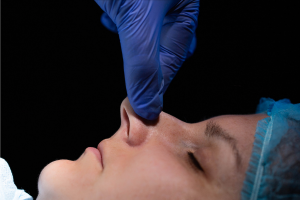Sinus issues can be incredibly frustrating, affecting your quality of life and overall well-being. Whether it’s chronic sinusitis, a deviated septum, nasal polyps, or allergies, these problems can lead to discomfort and, in some cases, severe health complications. Sinus surgery, particularly in places like Irvine, CA, can be a life-changing solution to these issues. In this comprehensive guide, we will explore the prevalence of sinus problems, the role of sinus surgery, common sinus issues, diagnosing techniques, when surgery is necessary, types of sinus surgery, the surgical process, risks, expected outcomes, recovery, and aftercare.
Sinus issues are more common than you might think. According to the American Rhinologic Society, chronic rhinosinusitis affects over 30 million Americans, making it one of the most common chronic medical conditions in the United States. Moreover, millions of individuals suffer from other sinus-related problems, such as nasal polyps and deviated septum. The prevalence of these conditions highlights the importance of understanding sinus surgery and its potential benefits.
Sinus surgery is a medical procedure performed to alleviate the symptoms of chronic sinusitis or other sinus-related problems. The goal of the surgery is to remove blockages, correct structural issues, and improve the overall function of the sinuses, allowing for better airflow and drainage. While not everyone with sinus issues will require surgery, it can be a life-changing solution for those who have exhausted non-surgical treatments without success.
Common Sinus Problems
Chronic Sinusitis: Chronic sinusitis is a condition in which the sinuses become inflamed and swollen for an extended period, usually more than 12 weeks. This can cause symptoms such as facial pain, congestion, headaches, and postnasal drip. Chronic sinusitis can be caused by various factors, including infections, allergies, and structural abnormalities.
Deviated Septum: A deviated septum is a condition in which the nasal septum, the wall between the nostrils, is significantly off-center or crooked. This can lead to breathing difficulties and may contribute to sinus problems by impeding proper drainage.
Nasal Polyps: Nasal polyps are non-cancerous tissues that develop in the lining of the nasal passages or sinuses. They can become large enough to block the nasal passages and cause nasal congestion, a reduced sense of smell, and frequent sinus infections.
Allergies and Sinus Issues: Allergies can exacerbate sinus problems, leading to inflammation and increased mucus production. This can worsen the symptoms of chronic sinusitis and other sinus issues, making effective allergy management an essential component of treatment.
Diagnosing Sinus Problems
Before considering sinus surgery, a thorough diagnosis is essential. This typically involves a combination of assessing symptoms and conducting tests and imaging studies.
Symptoms and Signs:
- Facial pain or pressure
- Nasal congestion
- Headaches
- Postnasal drip
- Reduced sense of smell
- Coughing
- Fatigue
Imaging and Tests:
- Nasal endoscopy: A thin, flexible tube with a camera is inserted into the nose to examine the nasal passages and sinuses.
- CT scan: This provides detailed images of the sinuses, helping identify structural abnormalities.
- Allergy testing: To determine if allergies are contributing to the problem.
Non-Surgical Treatments
In many cases, non-surgical treatments are the first line of defense against sinus issues. These may include:
Medications:
- Antibiotics for bacterial infections.
- Steroid nasal sprays to reduce inflammation.
- Decongestants to relieve congestion.
Lifestyle Changes:
- Humidification: Using a humidifier to maintain proper humidity levels can help reduce symptoms.
- Avoiding irritants: Minimizing exposure to allergens and irritants can be beneficial.
Allergy Management: Allergy medications or immunotherapy can help manage allergies and reduce sinus symptoms.
When Is Sinus Surgery Necessary?
While non-surgical treatments are effective for many individuals, there are cases where sinus surgery becomes necessary. Here are some common scenarios:
Failed Non-Surgical Treatments: If non-surgical treatments have been tried and failed to provide relief, surgery may be the next step.
Recurring Infections: Frequent sinus infections can be an indicator of an underlying problem that may require surgical intervention.
Nasal Obstructions: Structural issues like a deviated septum or nasal polyps can obstruct the nasal passages, leading to chronic symptoms.
Sleep Apnea and Sinus Surgery: In some cases, sinus surgery can help improve airflow and reduce sleep apnea symptoms.
Types of Sinus Surgery
Several different surgical procedures can address various sinus problems. The choice of surgery depends on the specific issue and the patient’s condition. Here are some common types:
Endoscopic Sinus Surgery: Endoscopic sinus surgery is a minimally invasive procedure that uses an endoscope, a thin, flexible tube with a camera, to remove blockages in the sinuses and correct structural issues.
Functional Endoscopic Sinus Surgery (FESS): FESS is a more extensive version of endoscopic sinus surgery that allows for more detailed and precise work within the sinuses.
Septoplasty: Septoplasty is a surgical procedure to correct a deviated septum, which can improve breathing and alleviate sinus symptoms.
Balloon Sinuplasty: Balloon sinuplasty is a minimally invasive procedure that uses a small balloon to open blocked sinus passages, promoting better drainage.
Image-Guided Surgery: This technology-assisted approach uses 3D imaging to guide the surgeon during the procedure, enhancing precision.
The Surgical Process

Preparing for Surgery: Your surgeon will provide you with detailed instructions on how to prepare for the procedure. This may include fasting before surgery and discontinuing certain medications.
The Surgery Day: Sinus surgery is typically performed under general anesthesia or local anesthesia with sedation, depending on the complexity of the procedure. The surgeon will make small incisions and use specialized tools to correct the issue.
Recovery and Hospital Stay: The length of your hospital stay will depend on the type of surgery and your individual circumstances. After the surgery, you will be monitored closely to ensure a smooth recovery.
Risks and Complications
As with any surgical procedure, sinus surgery comes with potential risks and complications. It’s essential to be aware of these, although they are relatively rare. Some possible complications include:
- Infection: Surgical site infections can occur, but they are typically treatable.
- Bleeding: Post-operative bleeding can be managed, but it is essential to follow post-operative care instructions.
- Anesthesia Risks: Anesthesia-related complications are rare but can occur.
- Changes in Smell: Some patients experience temporary changes in their sense of smell.
- Nasal Septum Perforation: A small hole in the nasal septum may occur but can often be repaired.
- Scar Tissue Formation: In some cases, scar tissue can develop, potentially causing future issues.
Expected Outcomes
The primary goal of sinus surgery is to improve the patient’s quality of life by alleviating symptoms and promoting better sinus health. The expected outcomes can vary depending on the type of surgery and the specific issue being addressed.
Relief from Symptoms: Patients often experience a significant reduction in symptoms such as congestion, pain, and postnasal drip.
Improved Breathing: For individuals with structural issues like a deviated septum, sinus surgery can lead to improved breathing.
Recovery Timeline: Recovery times can vary, but most patients can return to their normal activities within a few weeks.
Long-Term Success: Many individuals experience long-term relief from their sinus issues after surgery. However, ongoing sinus care and regular follow-up appointments are crucial for maintaining the results.
Recovery and Aftercare
Post-operative care is a crucial aspect of the recovery process. It involves various elements, including:
Post-Operative Care: Your surgeon will provide detailed instructions for post-operative care, which may include wound care, medication, and activity restrictions.
Managing Pain and Discomfort: Pain and discomfort are common after surgery, but these can be managed with prescribed medications.
Follow-Up Appointments: Regular follow-up appointments with your surgeon are essential to monitor your progress and address any concerns.
Resuming Normal Activities: Most patients can gradually resume their normal activities as they recover, but it’s essential to follow your surgeon’s guidance.
Lifestyle Changes for Sinus Health
Maintaining good sinus health is essential after surgery. To maintain sinus health, consider:
Allergy Management: Identify and minimize exposure to allergens.
Environmental Factors: Ensure your living space is clean and free from irritants.
Diet and Sinus Health: A balanced diet can support a healthy immune system.
Conclusion
Sinus surgery is a valuable medical intervention that can significantly improve the quality of life for individuals with chronic sinusitis, deviated septum, nasal polyps, and other sinus-related issues. If you’re struggling with chronic symptoms and non-surgical treatments have not provided relief, consider discussing the possibility of sinus surgery with a qualified surgeon.
By taking charge of your sinus health and exploring the benefits of sinus surgery, you can regain control over your well-being and enjoy a life free from the discomfort and inconvenience of chronic sinus problems. Your journey to better sinus health begins with understanding your options and seeking the guidance of a skilled healthcare professional.

